What I’m Most Proud of… Staff Reflections at ICFP
December 19th, 2018 | viewpoint
For the more than twenty JSI staff members who participated on panels and presented posters at the International Conference on Family Planning in Kigali, Rwanda, sharing their experiences on a global stage had a personal impact. From improving community-based family planning and population, health, and environment initiatives, to testing a total market approach and utilizing human-centered design, the team shared the some of the successes they’ve had implementing programs that strengthen health services and meet their country’s needs.
As staff gathered at the JSI exhibit booth, I asked them what they were most proud of in their work to strengthen health systems and the improve well-being of communities. around the world.
Florence Djihoun, JSI Benin, Advancing Partners & Communities (APC)
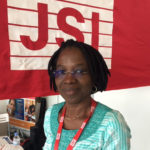 I am most proud of our role in the Benin Ministry of Health’s decision to train community health workers (CHWs) to deliver Sayana Press, a subcutaneous injectable contraceptive. This is important because CHWs can reach many more people than providers in facilities. We have introduced community-based administration of this method in 10 health zones, and are promoting local ownership so that this highly effective practice will continue when APC ends.
I am most proud of our role in the Benin Ministry of Health’s decision to train community health workers (CHWs) to deliver Sayana Press, a subcutaneous injectable contraceptive. This is important because CHWs can reach many more people than providers in facilities. We have introduced community-based administration of this method in 10 health zones, and are promoting local ownership so that this highly effective practice will continue when APC ends.
What I like most about my job is going to different parts of the country and talking with partners and community members. I enjoy hearing from people about their issues and helping them find solutions.
I’ve loved being at the conference and hearing about the latest family planning advancements and research. I was very interested to learn that religious leaders help promote family planning; they are not necessarily against it. Also, I was fascinated by the family planning methods for men that are in development. It’s very exciting!
Judith Anyona, JSI Kenya, InSupply
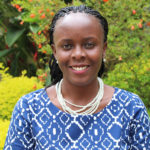 Everyone wants to know about Sayana Press! People from different countries—whether or not they are implementing self-injection—all want to know how it’s done. Our work in Kenya made it possible to introduce Sayana Press and providers are seeing that offering a self-injection contraceptive will provide increased access for women. This is a good thing!
Everyone wants to know about Sayana Press! People from different countries—whether or not they are implementing self-injection—all want to know how it’s done. Our work in Kenya made it possible to introduce Sayana Press and providers are seeing that offering a self-injection contraceptive will provide increased access for women. This is a good thing!
Adewole Adefalu, JSI Nigeria, ACCESS Collaborative
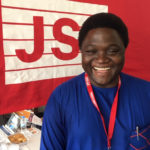 I am working on the ACCESS Collaborative project and now we have a chance to influence family planning in Nigeria on a significant scale. The project has done a lot in the past year and our activities have full government support.
I am working on the ACCESS Collaborative project and now we have a chance to influence family planning in Nigeria on a significant scale. The project has done a lot in the past year and our activities have full government support.
We launched and then expanded the government’s task shifting policy. We’ve overcome barriers to including Sayana Press on the essential medicines list. We’ve also identified and worked to eliminate some bottlenecks. And now, we are helping the government develop national guidelines for self-injection of Sayana Press and are writing the national training manual.
But I am most proud that JSI gives me a great team and the support and latitude to fulfill my dream of supporting the needs of my country, Nigeria.
Natasha Kanagat, JSI Seattle
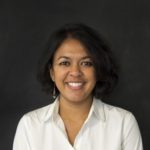 JSI is bringing measurement to areas that have not traditionally been measured. At ICFP, I presented at a session on research methods in human-centered design (HCD). While everyone is excited about its potential, the research on its influence on health programs is limited.
JSI is bringing measurement to areas that have not traditionally been measured. At ICFP, I presented at a session on research methods in human-centered design (HCD). While everyone is excited about its potential, the research on its influence on health programs is limited.
During the conference, members of the HCD Exchange Community of Practice convened to discuss applying HCD to adolescent sexual and reproductive health, and frameworks to guide how HCD is applied and measured.
It is exciting to look at the added value of HCD—at JSI we have examined its application within projects, tracing its application from how and when HCD was introduced, and how it contributed to health outcomes.
Read 3 case studies we conducted for the Innovations for MNCH Initiative:
Tanvi Pandit, JSI Washington, Advancing Partners & Communities
 The conference explored ways to expand equitable access and use of family planning for marginalized populations, and community health programs are clearly on the front lines of making that happen.
The conference explored ways to expand equitable access and use of family planning for marginalized populations, and community health programs are clearly on the front lines of making that happen.
Seeing communities engaged in designing policies that will improve their access to health and family planning services is incredibly rewarding. Our work on APC has bridged national policymaking with on-the-ground community realities. I am amazed to see the transformation in people’s attitudes when they feel empowered to influence national policy decisions that will improve their access to health services.
Elia dos Santos, JSI Timor-Leste
We work very closely with the government in Timor-Leste, and have developed family planning and other health materials that reflect its interests. We worked together on new materials for young couples, married women, and men in the communities. We have made popular short films as well as a series of PSAs and written materials, and developed different ways of mobilizing communities to share key messages. I’m so glad they appreciate the program, and the Ministry will use our materials in places where JSI does not work so our impact is even bigger than our program areas.
Check out the posters from Timor-Leste:
Jean Affo, JSI Benin, Advancing Partners & Communities
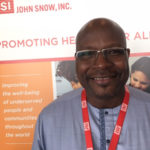 I am most proud of the progress we’ve seen only one year after we introduced Sayana Press in Benin. We have trained 917 community health workers and now more than 7,000 women have used Sayana Press. Sayana Press is important for Benin—it had been years since a new modern contraceptive method that can be distributed by community health workers in communities has appeared.
I am most proud of the progress we’ve seen only one year after we introduced Sayana Press in Benin. We have trained 917 community health workers and now more than 7,000 women have used Sayana Press. Sayana Press is important for Benin—it had been years since a new modern contraceptive method that can be distributed by community health workers in communities has appeared.
I am also proud of the support that we have from both the government and USAID—they’ve recognized our work and seem happy with our approach and our results.
Dr. Yvette Ribaira, JSI Madagascar, USAID Community Capacity for Health Program & Population Health, and Environment Activity
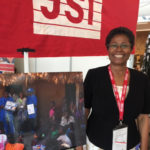 I am proud to be here at the conference to share the great things we’ve done in Madagascar to advance community health interventions, particularly population, health, and environment (PHE) work in Africa. Integrated PHE programs are critical because we see our natural resources being exploited as an economic source. But we need those resources to sustain us. And once they are gone, we are lost.
I am proud to be here at the conference to share the great things we’ve done in Madagascar to advance community health interventions, particularly population, health, and environment (PHE) work in Africa. Integrated PHE programs are critical because we see our natural resources being exploited as an economic source. But we need those resources to sustain us. And once they are gone, we are lost.
People and the environment are intertwined—if you do something to the environment, it affects people, and vice versa. This is both the problem and the solution. I am glad to have the opportunity to exchange PHE lessons and successes and ways that we can continue to apply its principles to programs.
Read Yvette’s presentation on SlideShare: Se réengager dans la Santé Population Environnement à Madagascar: Quelles contributions de la Planification Familiale
Yasmin Chandani, JSI Kenya, InSupply
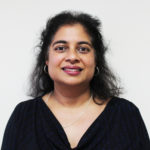 I am most proud of the difference our IMPACT Project teams have had and continue to have on people at all levels of the supply chain—when they see their data in an easy-to-understand and usable way their eyes light up! Once they realize that there are some supply chain problems they can solve, they become passionate about making changes. That is when we begin to see data visibility and accuracy improving and fewer stockouts—that is incredibly rewarding!
I am most proud of the difference our IMPACT Project teams have had and continue to have on people at all levels of the supply chain—when they see their data in an easy-to-understand and usable way their eyes light up! Once they realize that there are some supply chain problems they can solve, they become passionate about making changes. That is when we begin to see data visibility and accuracy improving and fewer stockouts—that is incredibly rewarding!
See Yasmin’s ICFP presentation: Placing People, Data & Processes at the Heart of Supply Chain Improvement
Kristen Devlin, JSI Washington, Advancing Partners & Communities
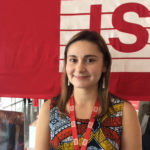 I’m excited that at this conference there is so much interest in our community-health systems catalog, which I’ve been in charge of for past few years. The catalog—which highlights more than 130 health interventions provided by community health workers and components of community health system including human resources, leadership, and governance—is a valuable resource for policy development.
I’m excited that at this conference there is so much interest in our community-health systems catalog, which I’ve been in charge of for past few years. The catalog—which highlights more than 130 health interventions provided by community health workers and components of community health system including human resources, leadership, and governance—is a valuable resource for policy development.
Here at the conference, we presented our findings on FP methods that CHWs are providing across 25 countries. People were very interested to learn how others are implementing FP programs at the community level and how their countries compare. The synthesis across countries is a legacy product from APC, and I am pleased that USAID recognizes the usefulness of this catalog.
See Kristen’s presentation on SlideShare: Which family planning methods can community health workers provide?
Liz Creel, JSI Washington, Advancing Partners & Communities
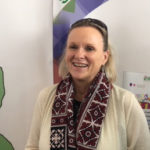 One of APC’s core areas is to strengthen NGOs and community programs, many of which serve marginalized groups in hard-to-reach areas such as northern Iraq and eastern Uganda. These programs provide needed family planning products, services, and technical assistance to girls, women, and their families. Through our work with international and local grantees such as International Medical Corps and the Uganda Protestant Medical Bureau, APC has helped strengthen critical reproductive, maternal, and child health services and improve overall health outcomes. At ICFP, it was great to see many of APC’s grantees represented and able to share their work, ranging from training village health teams on emergency contraception to working with faith leaders to strengthen community-based family planning.
One of APC’s core areas is to strengthen NGOs and community programs, many of which serve marginalized groups in hard-to-reach areas such as northern Iraq and eastern Uganda. These programs provide needed family planning products, services, and technical assistance to girls, women, and their families. Through our work with international and local grantees such as International Medical Corps and the Uganda Protestant Medical Bureau, APC has helped strengthen critical reproductive, maternal, and child health services and improve overall health outcomes. At ICFP, it was great to see many of APC’s grantees represented and able to share their work, ranging from training village health teams on emergency contraception to working with faith leaders to strengthen community-based family planning.
Alexis Heaton, JSI Raleigh, N.C.
 I was very excited to see all of the great work JSI has been doing to improve data visibility and use at various levels of the supply chain on display at ICFP. I’m really proud of our work with the Reproductive Health Supplies Coalition (RHSC) and other partners on the Global Family Planning Visibility and Analytics Network. We are improving collaboration to help ensure countries receive the appropriate quantities of FP products, while maximizing efficient use of limited resources.
I was very excited to see all of the great work JSI has been doing to improve data visibility and use at various levels of the supply chain on display at ICFP. I’m really proud of our work with the Reproductive Health Supplies Coalition (RHSC) and other partners on the Global Family Planning Visibility and Analytics Network. We are improving collaboration to help ensure countries receive the appropriate quantities of FP products, while maximizing efficient use of limited resources.
It was also great to learn more about the work of JSI’s IMPACT project teams in several countries, and to realize that we have learned about people, processes, and data from the global to the community levels can be applied in other settings and programmatic areas such as humanitarian logistics.
Elaine Rossi, JSI Boston
 I am so proud to be part of an organization that works on family planning and reproductive rights from almost every angle: service delivery, policy, training, youth education, supply chain and community health volunteer participation…both in the USA and overseas. To see such a wide array of presentations at ICFP just reinforced the sense that we are unique!
I am so proud to be part of an organization that works on family planning and reproductive rights from almost every angle: service delivery, policy, training, youth education, supply chain and community health volunteer participation…both in the USA and overseas. To see such a wide array of presentations at ICFP just reinforced the sense that we are unique!
Maafaka Ravelona, JSI Madagascar, Population, Health, and Environment Activity
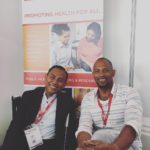 I was surprised by and proud of many things I heard during the conference. First, I was glad to learn that despite differences of faith, religious leaders are promoting FP. Their influence is huge and they can make a significant change in favor of FP for people.
I was surprised by and proud of many things I heard during the conference. First, I was glad to learn that despite differences of faith, religious leaders are promoting FP. Their influence is huge and they can make a significant change in favor of FP for people.
Seeing Malagasy youth at the conference was a great pleasure for me. They are scouts, activists, and students who can spread what they have learned among their peers. I was also proud of the side event that focused on the integration of population, health, and the environment, which we participated in. Clearly, more and more countries recognize the value of PHE, but Madagascar was one of the first.
During my time with JSI staff, I have felt the sense of family between everyone, which I really enjoy. The positive atmosphere is very motivating and encourages a sense of belonging.
Written by Penelope Riseborough
We strive to build lasting relationships to produce better health outcomes for all.